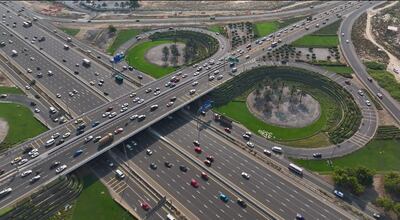Dubai authorities are exploring how much remote working and flexible hours could help drive down traffic congestion in the emirate.
Private sector employees have been invited to take part in a survey gauging the potential that working from home has for taking cars off the roads.
An email has been sent by Dubai Statistic Centre asking for workers to take part in the study, organised in association with the emirate's Roads and Transport Authority.
"The RTA is undertaking a study to understand the current situation in the private sector in relation to flexible work hours and remote working in order to widen the implementation of the mentioned practices given their impact in reducing traffic congestion, especially during rush hours,” the email read.
“The collected data will be confidentially and will be utilised only for the purpose of the study.”
Flexible plan wins support
Florian Kriechbaumer, 35, who works as chief operating officer for a Dubai-based technology company, told The National that he received the email earlier this month and took part in the survey.
"It can make a lot of sense to financially or incentivise private or public sector entities to adjust their policies in a way that reduces or spreads out concentrated rush hour traffic,” he said.
“[It could also] provide some flexibility in office working hours and could encourage car pooling or similar ideas.”
People taking the survey are asked a range of questions including "does your company offer flexible working hours?"
Other questions relate to current remote working options and if an employer offers flexibility on time in the office.
Mr Kriechbaumer said there could be a temptation to simply build more roads and car parks to meet the demands created by increased traffic.
"We also need to further improve the public transport service in high-density communities on the outskirts of the traffic corridors and build communities with more integrated work/ life options to reduce the need for longer commutes," he said.
Minister embraces new way of working
Omar Al Olama, Minister of State for Digital Economy, AI and Remote Working System, has stressed the need to update working practices to support the nation's development.
"Remote work is now a main way of work and not an option ... and we in the UAE must move from using the methods of remote work as a trend to using them as a quality and competitive advantage that improves the quality of life of residents and visitors to the UAE," said Mr Al Olama, during the Remote Forum event in Dubai in March.
Almost half, or about 46 per cent, of workers in the UAE work remotely in some form, Mr Al Olama said, citing figures from UK research company YouGov.
New approach to traffic management

The RTA is stepping up efforts to expand its road network to help meet the needs of a booming Dubai population that crossed 3.5 million in April last year, buoyed by a post-pandemic surge in migration.
Dubai Statistics Centre's live population counter stood at more than 3.63 million on Friday.
Earlier this month, the transport authority revealed details of a Dh689 million revamp of Hessa Street aimed at cutting congestion, reducing travel times and boosting safety on one of the emirate's busiest routes.
Motorists who spoke to The National said they backed the survey and hoped to see new regulations to cut congestion and travel times on their daily journey, especially to and from Dubai.
Marwan Abdulqader, 39, who lives in Sharjah, spends one hour each day reaching his job in Dubai.
“Having flexible working hours at companies in the private sector might help to reduce traffic. With Dubai and Sharjah's rapid urbanisation and population growth, traffic congestion has become a significant issue, leading to extended commutes,” said Mr Abdulqader.
“Dubai always thinks outside the box and having remote work and flexible working hours will reduce the journey time during rush hours.”
Zaid Nasser, a 42-year-old Yemeni living in Dubai, said the survey might lead to solutions to mitigate traffic challenges and enhance employee well-being.
“Dubai has traffic congestion hours as employees go to work at the same time in the morning and return home in the evening. Changing the start of the work window will reduce traffic,” Mr Nasser said.
“Dubai has many events that attract many visitors from around the world and this also causes traffic jams. I hope the officials will find solutions based on the study.”
The RTA and Dubai Statistics Centre were contacted for comment.

